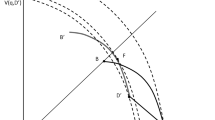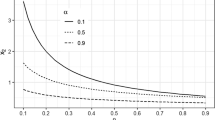Abstract
Lawsuits alleging illegal and unethical insurance sales practices have received widespread publicity in recent years. Although many observers have argued that one source of ethical conflicts for insurance agents is the industry's reliance on straight commission compensation, there remains a paucity of empirical data to support the claim. Therefore, we tested whether different forms of compensation influence insurance agent recommendations of products. We obtained survey responses from 336 insurance agents. Respondents were presented with a composite sketch of a hypothetical client. Following this description, they were asked to identify which one of eight specified life insurance products they would recommend to the client. A between-groups design was employed to manipulate differences in compensation associated with the eight products. Results indicated that neither amount of coverage nor type of coverage (term life versus cash value) recommended was associated with compensation. However, an unanticipated finding was that amount of coverage recommended was significantly higher when the insured was male than when the insured was female.
Similar content being viewed by others
References
Armstrong, S. J. and T. S. Overton: 1977, ‘Estimating Nonresponse Bias in Mail Surveys’, Journal of Marketing Research 14, 396-402.
Babbie, E.: 2001, The Practice of Social Research, 9th Edition (Wadsworth/Thomson Learning, Belmont, CA).
Barber, B.: 1983, The Logic and Limits of Trust(Rutgers University Press, New Brunswick, NJ).
Basu, A. K., R. Lal, V. Srinivasan and R. Staelin: 1985, ‘Salesforce Compensation Plans: An Agency Theoretic Perspective’, Marketing Science 4, 267-291.
Carson, J. M. and M. D. Forster: 1997, ‘An Analysis of Life Insurance Illustrations: Regulatory Implications of the Disparity Between Policy Yields Based on Illustrated Versus Actual Surrender Values’, Journal of Insurance Regulation 15, 480-501.
Cooper, R. W. and G. L. Frank: 1991a, ‘Business Ethics in the Insurance Industry’, Journal of the American Society of CLU and ChFC 45(May), 74-80.
Cooper, R. W. and G. L. Frank: 1991b, ‘Ethics in the Life Insurance Industry: The Issues, Helps, and Hindrances’, Journal of the American Society of CLU and ChFC 45(September), 54-66.
Cordell, D. M.: 1996, Fundamentals of Financial Planning(The American College, Bryn Mawr, PA).
Dubinsky, A. J., E. N. Berkowitz and W. Rudelilus: 1980, ‘Ethical Problems in Field Sales Personnel’, MSU Business Topics 28, 11-16.
Eastman, K. L., J. K. Eastman and A. D. Eastman: 1996, ‘The Ethics of Insurance Professionals: Comparison of Personal Versus Professional Ethics’, Journal of Business Ethics 15, 951-962.
Gravelle, H.: 1994, ‘Remunerating Information Providers: Commissions Versus Fees in Life Insurance’, The Journal of Risk and Insurance 61, 425-457.
Hoffman, K. D., V. Howe and D. W. Hardigree: 1991, ‘Ethical Dilemmas Faced in the Selling of Complex Services’, Journal of Personal Selling & Sales Management 11(4), 13-25.
Kurland, N. B.: 1991, ‘The Ethical Implications of the Straight-Commission Compensation System-An Agency Perspective’, Journal of Business Ethics 10, 757-766.
Kurland, N. B.: 1995a, ‘Ethics, Incentives, and Conflicts of Interest: A Practical Solution’, Journal of Business Ethics 14, 465-475.
Kurland, N. B.: 1995b, ‘The Unexplored Territory Linking Rewards and Ethical Behavior’, Business & Society 34, 34-50.
Kurland, N. B.: 1996a, ‘Sales Agents and Clients: Ethics, Incentives, and a Modified Theory of Planned Behavior’, Human Relations 49, 51-74.
Kurland, N. B.: 1996b, ‘Trust, Accountability, and Sales Agents' Dueling Loyalties’, Business Ethics Quarterly 6, 289-310.
Oakes, G.: 1990, ‘The Sales Process and the Paradoxes of Trust’, Journal of Business Ethics 9, 671-679.
Rinetti, M. A.: 2001, Promises, Promises: Ethics in the Insurance Industry, Unpublished Master's Thesis, Illinois State University, Normal, IL.
Robertson, D. C. and E. Anderson: 1993, ‘Control System and Task Environment Effects on Ethical Judgment: An Exploratory Study of Industrial Salespeople’, Organization Science 4, 617-644.
Robertson, D. C. and W. T. Ross: 1995, ‘Decision-Making Processes on Ethical Issues: The Impact of a Social Contract Perspective’, Business Ethics Quarterly 5, 213-240.
Ross, S.: 1973, ‘The Economic Theory of Agency: The Principal's Problem’, American Economic Review 63, 134-139.
Skipper, H. D.: 1995, ‘Market Conduct Issues and the Transformation of the U.S. Life Insurance Business’, Journal of the American Society of CLU and ChFC 49(March), 36-45.
Staples, E.: 2000, ‘Compensation Trail’, Advisor Today 95(August), 84-92.
Weber, J.: 1992, ‘Scenarios in Business Ethics Research: Review, Critical Assessment, and Recommendations’, Business Ethics Quarterly 2, 137-160.
Wincuinas, J.: 2000, ‘Market Conduct Challenges’, Best's Review 100(April), 126-128.
Author information
Authors and Affiliations
Rights and permissions
About this article
Cite this article
Cupach, W.R., Carson, J.M. The Influence of Compensation on Product Recommendations Made by Insurance Agents. Journal of Business Ethics 40, 167–176 (2002). https://doi.org/10.1023/A:1020355118527
Issue Date:
DOI: https://doi.org/10.1023/A:1020355118527




